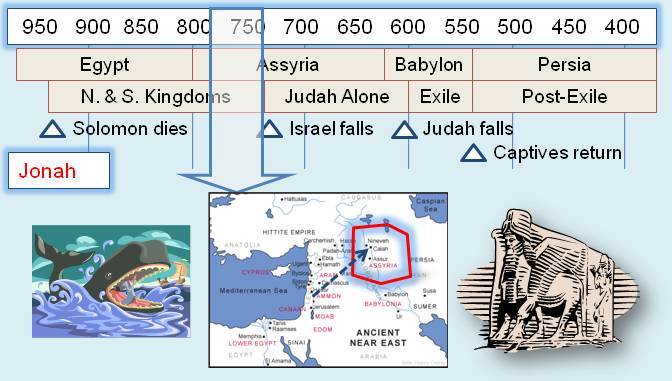A Survey of the Prophets - Jonah
|
Historical Background of the Book. Around 770 B.C. (about 160 years after Solomon's death), the Assyrians were a growing empire northeast from Canaan. However, during this time they were suffering from internal civil unrest, plague, famine, and what was viewed as a very evil omen - an eclipse in mid-June of 763 B.C.
The Author and the Audience. Jonah, whose name means "dove", was chosen by God to take a very important message to the Assyrian people. He was the son of Amittai from the town of Gath-hepher, about 3 miles NE from Nazareth (2 Kings 14:25). He was sent to the Assyrian capital city of Nineveh. It was huge by ancient standards housing over 120,000 people and taking about three days journey to traverse. Jonah's mission was to rebuke the Assyrians for their wickedness and threaten them with destruction if they did not repent. |
Outline/Major Themes. Unlike many of the Minor Prophets, the book of Jonah is mostly written in historical/story form. Within its four chapters is perhaps one of the better known children's Bible stories - Jonah and the big fish.
- Ch. 1:1-2:10 God commissioned Jonah who tried to flee by ship in the opposite direction about 2000 miles across the Mediterranean Sea to southern Spain. While at sea, the ship encounters a great storm, Jonah is thrown overboard and swallowed by a giant fish for three days.
- Ch. 3:1-4:11 Jonah repents and goes to Nineveh. They repent and God spares them. Jonah is angry at the turn of events and God uses a shade plant to teach him an important lesson about compassion.
- Assyrian was a Gentile/heathen nation - not part of God's chosen people.
- In about 25 years, the Assyrian Empire would expand into the land of Canaan with the Northern Kingdom becoming a tributary state. After an additional 25 years, the Northern Kingdom would be destroyed by the Assyrians and scattered across the Assyrian Empire.
- You can't run from God and you can't hide what you do (Psm. 33:13-14; Heb. 4:13).
- In the story of Jonah and the great fish, we see a foreshadowing of Jesus' entombment and triumphant resurrection from the grave (Matt. 12:38-40; 16:21; Luke 24).
- Although God had chosen to give special attention to the nation of Israel (e.g., the Law of Moses), He still cared about the Gentiles. His interaction with such nations is dimly glimpsed in the case of Jonah and the Assyrians. We see such care and concern fully expressed in the Gospel's invitation to all men, both Jew and Gentile (Rom. 3:29; Acts 10:35).
- You can never tell for certain how people will respond to the Gospel message. God chose an obscure Jew to carry His message to the mighty Assyrian nation.
- Repentance of sin has always been part of God's plan for saving mankind (Matt. 12:41; Acts 2:38).

